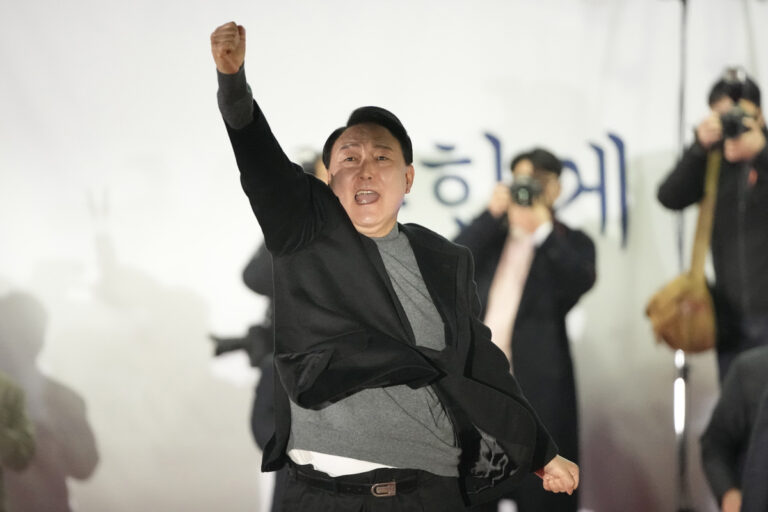In South Korea, AI deepfakes of politicians are being used to win the hearts of the people
As a star prosecutor in South Korea, Yoon Suk-yeol, the leading conservative candidate in the country’s presidential election, helped imprison two former presidents as well as the head of Samsung and a former chief justice of South Korea’s Supreme Court on charges of corruption. Today, as citizens cast their votes, Yoon hopes to become president himself by appealing to South Koreans who are deeply dissatisfied with the outgoing president, Moon Jae-in.
And Yoon has called on a secret weapon to boost his popularity among younger audiences—artificial intelligence, more precisely, deepfakes. The so-called ‘AI Yoon’ stood in as a replacement for the ‘real deal’ in short video clips. Why? Because AI Yoon looks and gestures much like the real-life politician it is based on—only its answers are wittier and more likeable.
“A sharp-tongued former prosecutor, the 61-year-old Mr. Yoon is new to politics and wanted an efficient way to reach out to the electorate. He needed to pursue young voters and sought a softer public image, and had just roughly three weeks to officially campaign by law,” explained the Wall Street Journal (WSJ) on the logic behind AI Yoon.
“We want voters to see the human side of Yoon—not the stern image he projects on television,” Baik Kyeong-hoon, head of the campaign’s AI Yoon team, further told the publication. Over 80 clips of Yoon’s deepfake have been shared on social media platforms, attracting more than 70,000 comments since making its debut in January 2022. The videos are typically 30 seconds or less, posted on a daily basis and often show AI Yoon answering voters’ questions picked beforehand by the candidate’s campaign staffers. Once a question is selected for the day, its answer is redacted and delivered by the digital avatar.
AI Yoon addresses a myriad of topics including North Korean missile launches and fake news, the K-pop girl band Blackpink—according to the WSJ, one of their songs is AI Yoon’s “karaoke go-to”—and his grocery shopping list that day (eggs, green onions, anchovies and beans).
In turn, “Yoon is learning from his AI Yoon messages,” said Lee Jun-seok, head of the candidate’s People Power Party, who came up with the idea of the deepfake version. Following the success of his digital self, Yoon has adapted what he brings up on the campaign trail and how he says it. Considering the fact that AI-generated fake faces have been proven to be more trustworthy than real ones, it comes as no surprise that AI Yoon has played a crucial role in the candidate’s presidential campaign.
In an attempt to slow down the deepfake’s rise in popularity, Democratic Party officials initially blasted AI Yoon, calling the technology fraudulent and a threat to democracy. Yet soon after, an AI version of Lee Jae-myung, Yoon’s progressive rival, emerged too. His party justified the move by saying that it was different because Lee’s avatar was made from real footage of his actual comments, such as reciting his election pledges and slogans. In contrast, Yoon’s computer-generated remarks “purposefully hid Mr. Yoon’s flaws,” a Democratic Party official said.
Currently, South Korea’s presidential race is a tight showdown between Lee and Yoon. People in their 20s and 30s have now become swing voters, expressing dissatisfaction with the state of the economy and soaring real-estate prices. Outgoing president Moon and his Democratic Party have also been rocked by a series of scandals that exposed ethical lapses and policy failures. As a result, more than half of the electorate wants a change from the current Moon administration, according to a Gallup Korea polling.
That has given Yoon—who has especially targeted young men and taken a stab at feminism—a shot with a younger demographic that has historically avoided conservatives. Lee Seong-yoon, a 23-year-old college student, first thought AI Yoon was real after viewing a video online. Watching Yoon talk at debates or on the campaign trail can be dull, he explained to the WSJ. But he now watches AI Yoon videos in his spare time, finding the digital version of the candidate more relatable, in part because “he speaks like someone his own age.” He said he is voting for the candidate.
“I’m not so worried about deepfake technology because any technology can be used for good or bad,” he further told the publication. The technology behind AI Yoon is provided by the Seoul-based DeepBrain AI, which synthesises voice and video to produce a human-looking avatar that can hold down real-time conversation. “It’s a bit creepy, but the best way to explain it is we clone the person,” said John Son, who heads Asia-Pacific business development at DeepBrain AI, to the WSJ.
But what’s really to be acclaimed here is the work Yoon’s campaign team did. When the digital version of the candidate first launched, it completely tanked. The deepfake was too serious and unapproachable as it answered policy questions—much like its real-life counterpart. Then, the staffers thought of changing the type of questions AI Yoon would be answering, which is when questions from voters started appearing along with some humorous answers from the deepfake.
“What’s your MBTI?” one voter asked, the acronym for the workplace personality test. “My personality type is ENFJ, the same as Barack Obama,” AI Yoon responded, referring to a personality type common among outgoing and warm leaders. “Have an energetic day, Barack Obama!” he added.
No matter the question, script writers try to make each response funny and understandable even to a middle schooler, Baik, head of the AI Yoon team, told the WSJ. If Yoon wins today’s election, the career of AI Yoon could be extended too, said Lee Jun-seok, leader of the People Power Party. He envisions one of DeepBrain AI’s kiosks greeting visitors at the presidential Blue House.






